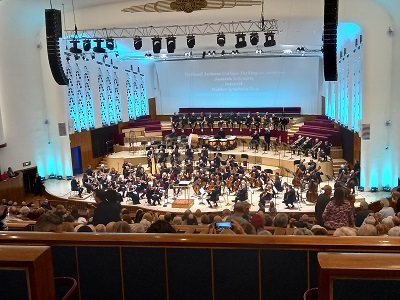
After a long gap, I made a sudden dash to London.
I caught early trains from Blundellsands and Crosby and Lime Street.

On the London express, I think I may have been in the presence (sitting behind me) of Robbo from Runcorn (you know, the one who shagged his step-sister). On his mobile phone, using a quiet, gravelly voice that reverberated throughout the carriage, he soon made me (and all of the other passengers) aware that...
- Last night had been epic
- He had just grabbed a muffin in 'Spoons
- Our carriage was roastin' and he was sweatin'
- He had a spliff in his pocket and he was sure it was stinkin' the carriage out
Then the Ticket Inspector appeared just before Crewe and he shot off like whippet. I never saw him again.
The flying visit was organised some six weeks ago so that I could attend Covent Garden for a performance of Don Giovanni. I managed to grab a cheap room for the night in the Brunswick hotel which was meant to hold just two stars but they may well have been gained in the 1950s. Then rail strikes were announced and I thought I would cancel. Then they were cancelled because queenie died so I decided to chance it.
I landed in an odd sort of London which (though not as abandoned as in pandemic times) was subdued and collecting itself before staging a monster event the following Monday.
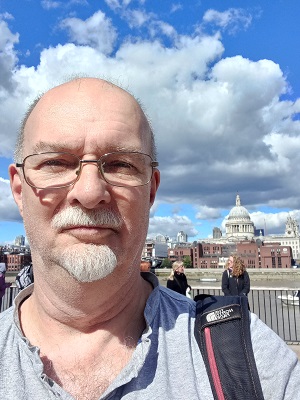
I suppose it would not have been possible to move around Central London at present without encountering THE QUEUE. I locked horns with it outside Tate Modern and on Millbank. I was a bit peeved that none of the camera crews felt that I was worth interviewing. I had my choice words about grief porn all ready to go.
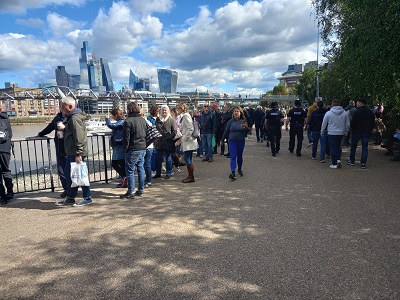
I ended up at Tate Britain walking round an exhibition of paintings by Walter Sickert. It made a useful complement to the exhibition in Liverpool last December.
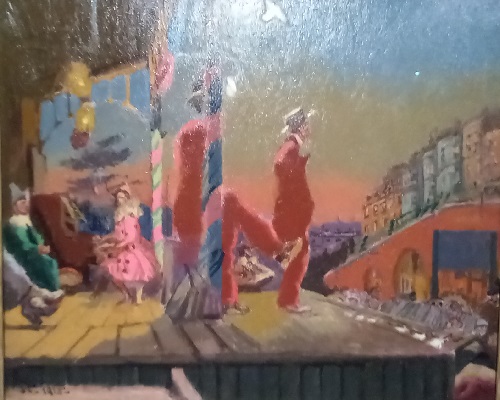
For example, the works in the Liverpool exhibition seemed to be based around a very reduced tonal pallette. This party of vaudeville entertainers performing on the Brighton seafront showed that Sickert was quite capable of introducing primary colours into his work if they were required.
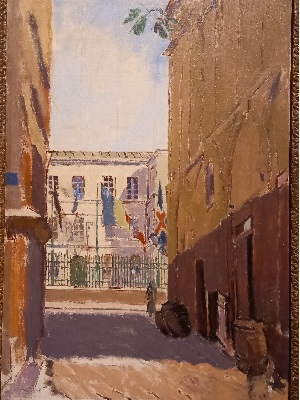
The street scenes in Liverpool all seemed to be universally set in a twilight world of shadows and dullness. This scene is broad daylight. It possibly commemorates the day that the UK joined France and Germany in opposing Germany in the autumn of 1914.
The flags were at half-mast outside of Covent Garden. But I was told an anecdote which made me reconsider any thought that I might be having a bad day. I was invited to imagine the cringe-making awkwardness of the cast of Wicked in the West End on the day of QEII's death as they opened that night's performance with the line...
Good News! She's Dead!!
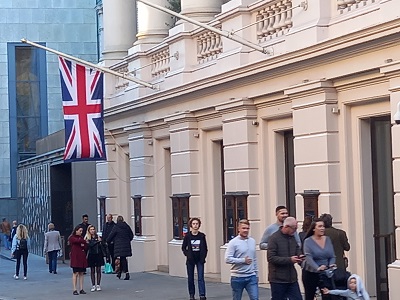
The Covent Garden plaza seemed somewhat quiet for a Friday evening.
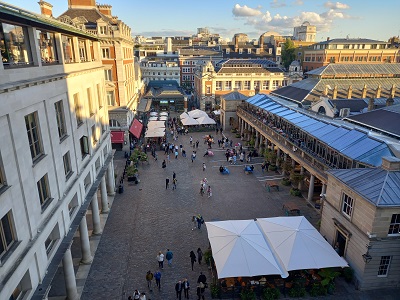
Colin wondered if they would have the new CR on the curtains in yet.
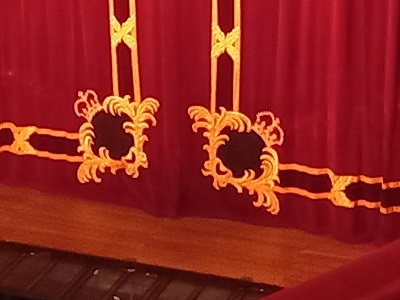
The answer was no. They had certainly removed the old ER quickly enough when the announcement was made. However, they didn't cancel that night's performance of Richard Srauss's Salome. But then a story about a dysfunctional royal family with odd sexual proclivities would seem merely to hold a mirror up to nature.
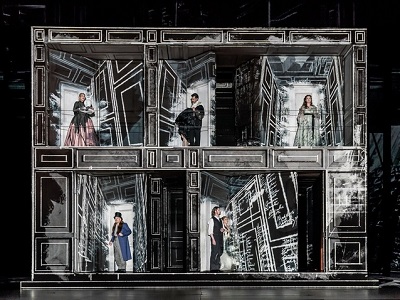 And so the houselights went down and the curtain went up and I got to witness Kasper Holten's amazing production of Don Giovanni in the flesh. The use of computer generated imagery within the very fabric of the central abstracted structure is just phenomenal - one of those occasions when a clever idea is used with absolute discretion and intelligence.
And so the houselights went down and the curtain went up and I got to witness Kasper Holten's amazing production of Don Giovanni in the flesh. The use of computer generated imagery within the very fabric of the central abstracted structure is just phenomenal - one of those occasions when a clever idea is used with absolute discretion and intelligence.
I was also wholly engaged by the music-making. Constantin Trinks conducted a reduced sized orchestra in a historically informed manner - which did not mean taking everything at a great speed. What happened was that I could hear the artists singing actual words which meant that I had to use the surtitles much less often than I usually do and became thoroughly involved in the business on stage.
The cast were individually and collectively outstanding. Particular mention to Christopher Maltman as Leporello, Maria Bengtsson as Donna Anna and Charles Castronovo as Don Ottavio but the whole crew were top class.
It was by far and away the best Don Giovanni I have attended in an age and one of the best performances I have attended in an age.
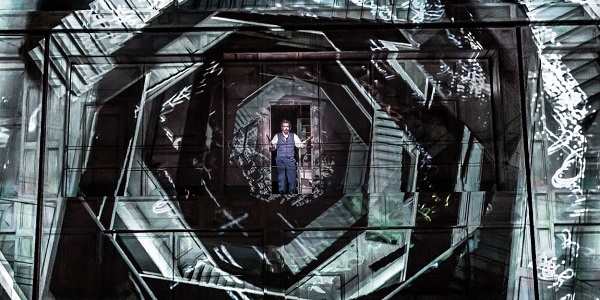
I made it back to Liverpool by mid-afternoon, just in time to eat something with Ross before Roland collected me to whisk me off to the opening of the Phil's new season. This was the sort of clash or near clash that is happening more often these days. Somehow, I did not spot the evidence of my diary which told me quite clearly that the two events lay on consecutive days some 240 miles apart. It's a worry. I accept that my mental faculties are not as acute as they were twenty years ago (that much is probably natural). There's a lurking concern, however, which takes me straight back to my dad's dementia.
So it's perhaps not surprising that the relative whirlwind of the previous thirty-six hours had depleted my reserves to the point where I did not take to the concert - even to Janáček's Sinfonietta. It was rousing enough but without a genuine Eastern European lilt. The second half consisted of Mahler's Symphony No4 which I had previously only ever heard on the radio or on a recording. I can't say that it has ever been among my favourites among Mahler's symphonies. The performance made as good an attempt as is possible to persuade me of its worth: it entirely failed to change my judgement. I don't think that I shall give it another go in my lifetime.
